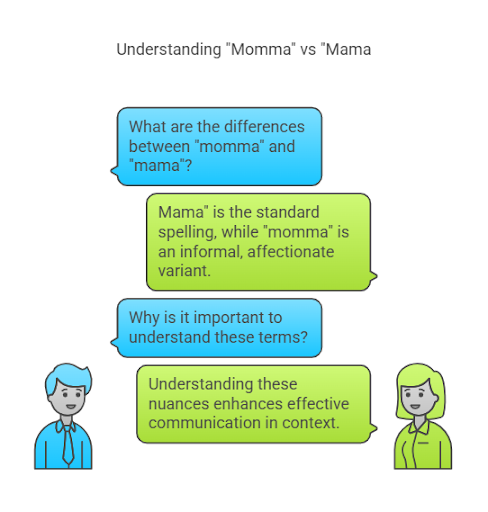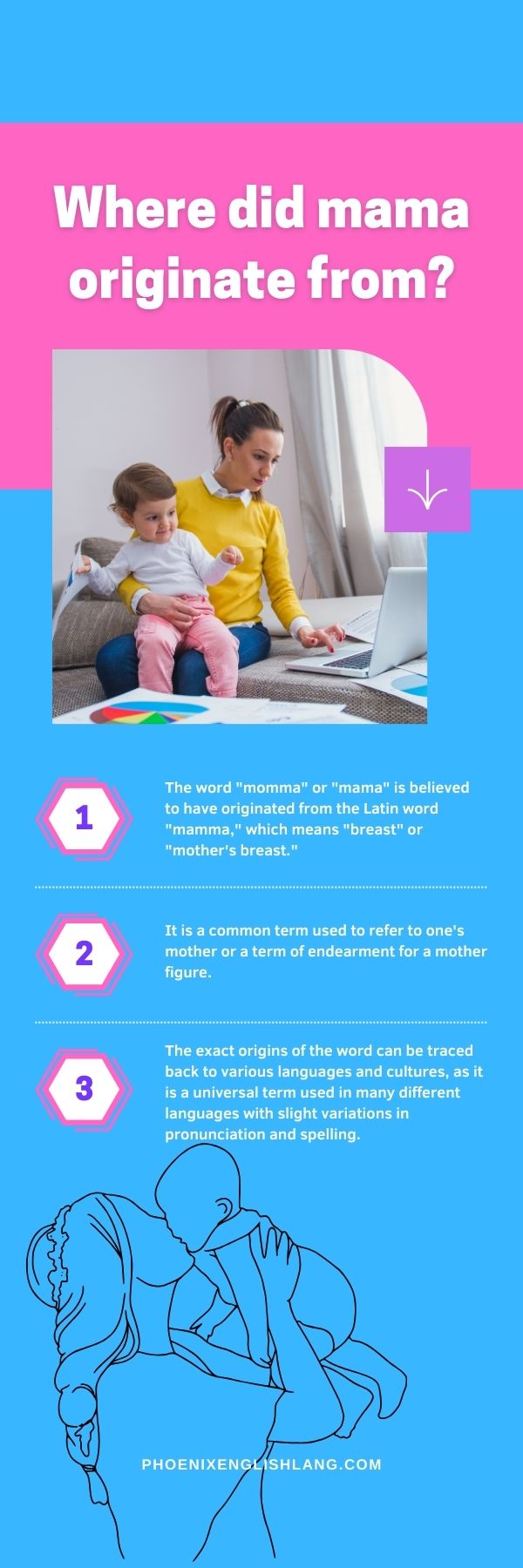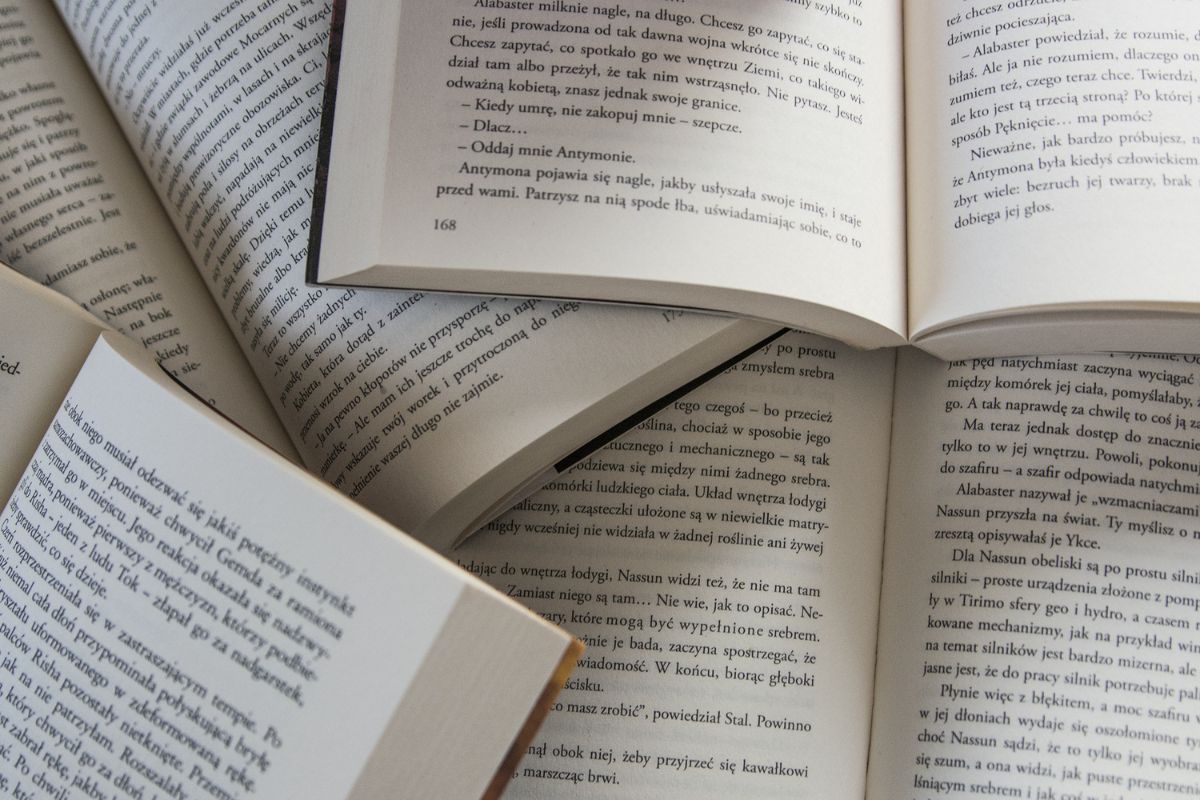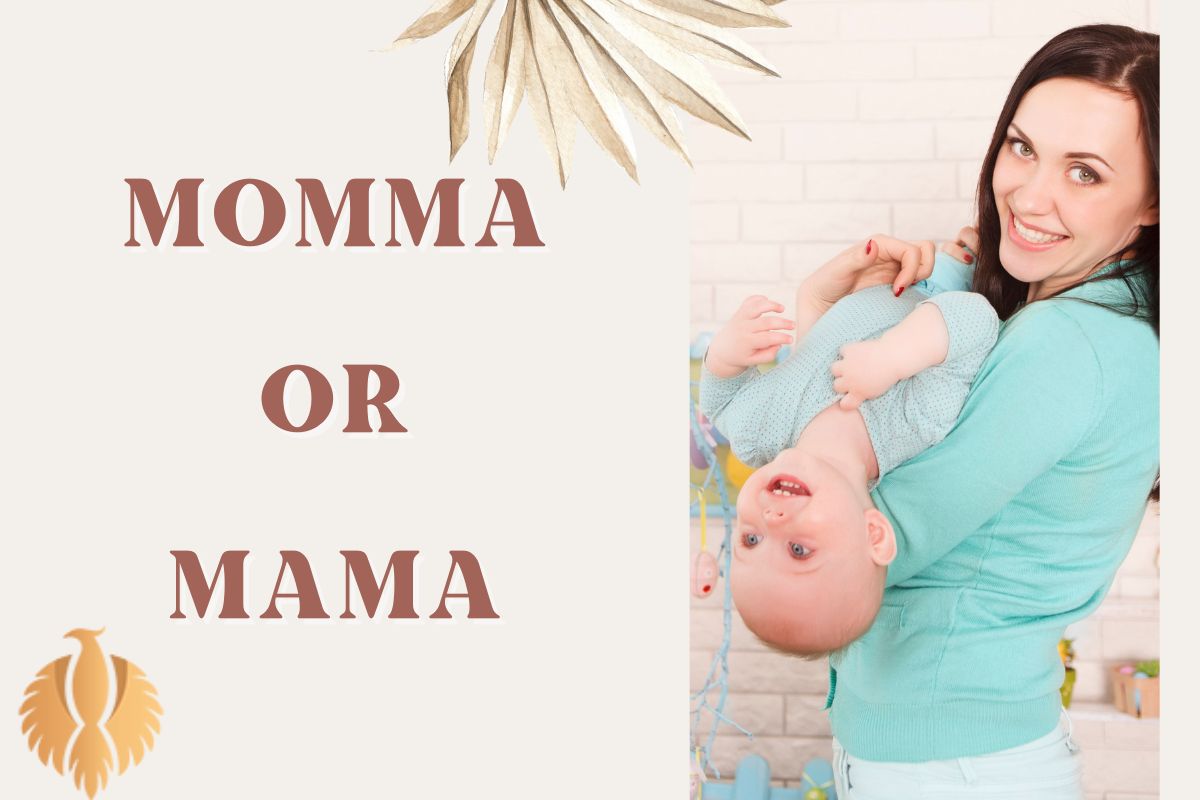Both “momma” and “mama” are acceptable spellings for words used to refer to one’s mother, but they have slightly different connotations and usages.
“Mama” is the more standard and widely recognized spelling in English, while “momma” is often considered a more informal or affectionate variant.
Understanding the nuances of these terms is essential for effective communication, particularly in context.

Important Points:
- Standard Usage: “Mama” is the conventional spelling and is recognized across many English-speaking regions. It is often seen in literature, songs, and formal contexts. For example, “I called my mama to wish her a happy birthday.”
- Regional Variations: The use of “momma” is more common in certain dialects and can convey a warmer, more endearing tone.
It may be used in informal situations or conversations within families. For instance, “Momma makes the best cookies” emphasizes affection and familiarity.
- Cultural References: “Mama” and “momma” can also appear in cultural references, such as songs, movies, and literature.
Their usage might be influenced by regional dialects, traditions, or personal preferences, making both terms culturally relevant.
- Pronunciation: Both terms are typically pronounced similarly, often as /ˈmɑː.mə/ or /ˈmæ.mə/. This similarity makes them interchangeable in many spoken contexts, though the spelling can affect the tone of a sentence.
- Correct Spelling in Context: When deciding which form to use, consider the context.
In formal writing or public communications, “mama” is generally the better choice, while “momma” may be more appropriate in personal letters, informal writing, or creative works where a colloquial tone is desired.
You might also enjoy: Top 100 Commonly Used Verbs That Start With D [2024]
As we delve deeper into the discussion of “momma” vs. “mama,” we will explore definitions, correct usage examples, and tips for choosing the right term based on context.
This exploration will help clarify their meanings and guide you in selecting the most fitting expression in various communications.
In the rich landscape of English language and expression, terms related to family often reflect deeper layers of emotion and cultural significance.
The words “momma” and “mama” evoke feelings of love, care, and the unique bond between a child and parent.
As we analyze these two terms, it becomes clear that while they may serve the same purpose—referring to one’s mother—their usage can vary based on formality, regional dialects, and personal preference.
Using “mama” might be seen as more universally acceptable, while “momma” can carry a charming, intimate touch that encapsulates warmth and familial closeness.
Moreover, language evolves with society, and the way we refer to our loved ones can shift over time, influenced by cultural trends and individual experiences.
For instance, songs that celebrate mothers may favor one spelling over the other, impacting how we perceive these terms culturally.
When choosing between “momma” and “mama,” it’s helpful to reflect on who your audience is and the tone you wish to convey.
In formal settings—like academic papers, business communications, or social media posts that require professionalism—”mama” is often the safer option.
However, in personal correspondence, creative writing, or casual conversation among friends, “momma” could enhance the warmth and affection you desire to express.
As we continue to navigate through the nuances of these words, we recognize that they are more than mere forms of address; they encapsulate the love and connection that define family relationships.
By using these terms thoughtfully, we enrich our communication and promote a sense of closeness and endearment that resonates with our audiences.
Understanding the correct application of “momma” and “mama” through examples and context will aid in mastering not only the terms themselves but also the subtleties of expressing familial relationships in English.
You might also enjoy:Looking Forward To Seeing You: Grammar + Examples[2025]
Where did mama originate from?

The word “momma” or “mama” is believed to have originated from the Latin word “mamma,” which means “breast” or “mother’s breast.”
It is a common term used to refer to one’s mother or a term of endearment for a mother figure.
The exact origins of the word can be traced back to various languages and cultures, as it is a universal term used in many different languages with slight variations in pronunciation and spelling.
You might also enjoy:Emersion Vs Immersion: Meaning, Differences, and Examples
How old is the word mama?
The word “mama” is ancient and can be traced back to early forms of language. It is a common term for mother in various cultures and has been used for centuries. The exact age is challenging to determine due to the evolution of languages over time.
My suggestions for using momma and mama in a sentence:

Both “momma” and “mama” are informal terms used to refer to one’s mother. The choice between the two often depends on personal preference or regional variations.
Here are a few examples of sentences using “momma” and “mama” in context:
- “I love you, momma.”
- “Mama, can you help me with my homework?”
- “Momma always knows how to make me feel better.”
- “Mama, I’m hungry. Is dinner ready?”
- “I miss my momma when I’m away from home.”
- “Can I call you momma instead of mother?”
- “Mama, thank you for always being there for me.”
- “Momma, can you tell me a bedtime story?”
- “Mama, I need your advice. What should I do?”
- “I love spending quality time with my momma.”
- “Momma, you’re the best! Thank you for everything.”
- “Mama, can I have some chocolate, please?”
- “Momma, you’re my hero. I look up to you.”
- “Mama, I appreciate all the sacrifices you’ve made for me.”
- “I feel safe and loved when I’m with my momma.”
- “Momma, can you teach me how to bake cookies?”
- “Mama, I’m proud to have you as my mother.”
- “Momma, you have a heart of gold.”
- “Mama, can we go to the park this weekend?”
- “I have the best momma in the world.”
- “Mama, you’re my rock. Thank you for your support.”
- “Momma, can I have a hug?”
- “Mama, you’re the glue that holds our family together.”
- “I cherish the moments I spend with my momma.”
- “Momma, I’m grateful for all the love you’ve given me.”
- “Mama, you’re my biggest cheerleader.”
- “Momma, your smile brightens up my day.”
- “Mama, can I tell you about my day?”
- “I’m lucky to have such a caring momma.”
- “Momma, I love you to the moon and back.”
I can help you come up with some questions related to “momma.”
Here are 30 questions that you could consider:
- What is your fondest memory with your momma?
- How has your momma influenced your life?
- What is the best advice your momma has ever given you?
- What are some of your momma’s favourite hobbies?
- How does your momma show her love for you?
- What is your momma’s favourite meal to cook for you?
- How does your momma handle stress or difficult situations?
- What values has your momma instilled in you?
- How has your relationship evolved with your momma over the years?
- What do you admire most about your momma?
- What are some funny or memorable moments you’ve shared with your momma?
- How has your momma supported you in pursuing your goals?
- In what ways do you and your momma differ in terms of personality?
- What traditions or rituals do you have with your momma?
- What are some challenges your momma has overcome in her life?
- What’s the best lesson your momma has taught you about relationships?
- How has your momma’s style influenced your own fashion sense?
- What’s the most meaningful gift you’ve ever received from your momma?
- How does your momma celebrate special occasions or holidays?
- What childhood story of your momma’s do you find most endearing?
- How has your relationship with your momma influenced your parenting style, if applicable?
- What are your momma’s favourite books, movies, or music?
- What’s the funniest thing your momma has ever said or done?
- What’s the best piece of advice you’ve passed on to others from your momma?
- In what ways do you see yourself resembling your momma?
- Have you ever made a strong effort to emulate a particular trait or characteristic of your momma’s?
- What are some of the biggest sacrifices your momma has made for you?
- How has your momma inspired you to pursue your passions?
- What’s your momma’s dream for the future?
- How has your momma handled life’s biggest challenges and what can you learn from her approach?
You Might Also Enjoy: Top 60 Most Common Simple Sentences In English
How and when use Momma and Mama

General Usage
- Regional Preference: “Momma” is more commonly used in American English, while “Mama” is often favored in British English.
- Informal Context: Both terms are informal and are typically used in casual or familiar settings.
- Endearment: Both “Momma” and “Mama” are terms of endearment used by children or loved ones to address their mothers.
Age of the Speaker
- Child’s Speech: Young children often use “Mama” or “Momma” as one of their first words to refer to their mother.
- Teens and Adults: Older children, teenagers, and adults may use “Mama” or “Momma” affectionately when referring to their mother, especially in informal conversations or when expressing warmth.
Family Traditions
- Cultural Background: The use of “Momma” or “Mama” can be influenced by cultural background and family traditions.
- Family Dynamics: Families may have their own preferences for which term to use, often passed down through generations.
Emotional Context
- Comforting Tone: “Momma” can convey a more comforting or nurturing tone, often associated with being cared for.
- Casual Affection: “Mama” might be used in a more affectionate or playful context among adults and children.
Usage in Dialogue
- Storytelling: Characters in children’s books often use “Mama” or “Momma” to connect with younger audiences, making the characters relatable.
- Crafting Dialogue: Writers may choose “Momma” or “Mama” based on the character’s background, age, and emotional state.
You might also enjoy:How Are You Fairing or Faring? Differences + Examples
Cultural Representations
- Music and Folklore: Terms like “Mama” are often found in songs and folklore, symbolizing love and care.
- Movies and TV Shows: The choice of “Mama” vs. “Momma” in scripts can add to the authenticity of character backgrounds.
Phonetic Considerations
- Pronunciation: “Momma” may have a slightly different phonetic quality, often pronounced more quickly, while “Mama” has a more drawn-out vowel sound.
- Spelling Variations: Different communities might adopt one spelling over the other, but both refer to the same person.
Usage in Writing
- Letters and Cards: “Mama” is often used in letters or cards for special occasions, such as Mother’s Day.✨
- Social Media: Both terms are frequently used in social media posts to express love or share memories involving one’s mother.
Regional Variations
- Southern Usages: In some Southern American dialects, “Momma” is the preferred term, often used across generations.
- International Use: Other languages might have similar words (like “Maman” in French) that serve the same affectionate purpose.
Personal Preference
- Individual Choice: Ultimately, the choice between “Momma” and “Mama” is personal and can change over time or in different contexts.
- Consistency in Use: It’s helpful to be consistent with whichever term you choose, especially around the mother in question, to avoid confusion.
Contextual Considerations
- In Formal Settings: In formal conversations, it’s more appropriate to use “mother” rather than “Momma” or “Mama.”
- When Introducing: When introducing your mother in formal settings or to acquaintances, you might choose “my mom” or “my mother” instead.
Emotional Connections
- Creating Bonds: Using “Momma” or “Mama” can strengthen emotional bonds between family members.
- Cultural Affection: The choice of term can also reflect cultural norms around family affection and respect.
Legacy and Heritage
- Family Names: Some families adopt “Momma” or “Mama” as part of their family heritage, making it a legacy term.
- Grandchildren’s Use: Grandchildren may choose to use “Momma” or “Mama” based on what they hear from their parents, perpetuating the term’s use.
Special Circumstances
- When Comforting: “Momma” may be used by adults when seeking comfort during tough times or significant life events.
- Playful Context: In playful settings such as games or light-hearted conversations, either term can be used interchangeably without negative connotation.
- Reflective of Relationship: The choice between “Momma” and “Mama” may also reflect the nature of the relationship, with “Momma” often signifying a more playful or close bond.
You might also enjoy:Too Cute Meaning Vs To Cute (To Vs Too) + Examples
Here are some idiomatic expressions that include the word “mama”

1. Mama’s boy
This phrase refers to a man who is overly attached to his mother and may seek her approval or permission for almost everything.
2. Mama bear
This term is used to describe a mother who is fiercely protective of her children, much like a bear defending her cubs.
3. Mama’s boy/girl
This expression can refer to someone who is overly dependent on their mother, often in a pejorative sense.
4. Sugar mama
This term typically refers to an older woman who financially supports a younger romantic partner.
5. Mama didn’t raise no fool
This idiomatic phrase is used to assert that one is not foolish and is capable of making sensible decisions, with the implication that one’s mother raised them well.
These idioms are commonly used and understood in English. They are often used to convey specific ideas or characteristics related to the concept of “mama.”
You might also enjoy:What Kind of Vs What Kinds of – Differences + Examples [2025]
Momma and mama formality

The terms “momma” and “mama” are informal ways of referring to one’s mother. They are often used in a familiar or affectionate manner.
The choice between “momma” and “mama” is largely a personal preference and can vary depending on cultural or regional differences.
In terms of formality, “mom” or “mother” would be considered more formal options.
How do British people say mama?

In British English, people often say “mum” instead of “mama” as a term for their mothers. The pronunciation is more commonly “muhm” in the UK.
Momma in literature

“Momma” and variations of the word “momma” have been used in literature to evoke themes of familial bonds, motherhood, and the nurturing role of mothers. Here are a few notable instances where “momma” appears in literature:
1. To Kill a Mockingbird by Harper Lee
In this classic novel, the Finch children, Scout and Jem, refer to their mother as “Atticus’s wife” or “our mother,” as the story is narrated from Scout’s perspective.
However, their maternal figure, whose name is Jean Louise Finch, is also known as “Atticus, do I have a momma?” has a significant presence in the story, especially in Scout’s memories and reflections.
2. The Color Purple by Alice Walker
In this Pulitzer Prize-winning novel, the protagonist Celie writes letters to God throughout the book, addressing them “Dear God” or “Dear Nettie,” her sister.
She also mentions her mother as “momma” in the letters, reflecting on the impact of her mother’s absence in her life and the profound effect of maternal bonds.
3. Beloved by Toni Morrison
Sethe, the protagonist of the novel, often references her deceased mother as “momma.” The bond with her mother is a recurring theme in the book, and Sethe’s memories and reflections regarding her mother play a significant role in shaping her character and experiences.
4. Mama Day by Gloria Naylor
In this novel, the character Miranda “Mama” Day, who is a central figure in the story, is referred to as “Mama” by the other characters.
The novel explores themes of family, tradition, and the deep connections between generations, with “Mama” as a prominent symbol of these ties.
These examples illustrate how “momma” and its variations are used in literature to portray the concept of motherhood, family relationships, and the impact of maternal figures on characters’ lives.
The usage of “momma” in literature often serves as a powerful literary device to evoke emotions, portray familial dynamics, and convey the complexities of the mother-child relationship.
You might also enjoy:Interested In or On: The Differences + Examples [2025]
Does every culture says mama?
No, not every culture says “mama” to refer to their mothers. The use of specific terms for mother varies across different languages and cultures.
For example, in Spanish, the term “mamá” is commonly used, while in French, “maman” is used.
In some cultures, different variations of “mother” or “mom” are used, such as “mama” in Swahili or “umma” in Korean.
It’s important to note that these terms can also vary within different regions or dialects within a culture.
It may seem redundant to have “mamma” be a spelling when “mama” exists, but that’s what makes “mamma” so unique.
It’s the rarest spelling of “mama”. However, did you know that mamma is more grammatically correct than mama because it comes from the Latin word “mamma”?
Despite how mama is the most said, momma and mamma are the two that are more grammatically correct.
Momma is the best when it comes to grammatical correctness. Regardless, all three are okay to use no matter how common or uncommon they are.

Hi, welcome to my blog! My name is Omid and I am thrilled to have you here! I am an English language teacher with 12 years of experience and hold multiple international certifications (TESOL, IELTS, TOEFL, PTE, CELTA). Additionally, I hold a PhD in Applied Linguistics with a specialization in Teaching English as a Second Language (TESL), which fuels my passion for teaching English and assisting others in mastering the language. To me, nothing is more rewarding than helping individuals enhance their English language abilities through various methods. So, let’s embark on this journey of learning English together.




